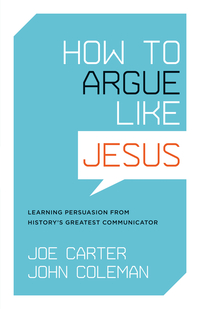How to Argue Like Jesus, reviewed by Steve D. Eutsler
 Joe Carter and John Coleman, How to Argue Like Jesus: Learning Persuasion from History’s Greatest Communicator (Wheaton, Ill.: Crossway, 2009), 174 pages, ISBN 9781433502712.
Joe Carter and John Coleman, How to Argue Like Jesus: Learning Persuasion from History’s Greatest Communicator (Wheaton, Ill.: Crossway, 2009), 174 pages, ISBN 9781433502712.
Ever since Augustine said, “For since by means of the art of rhetoric both truth and falsehood are urged, who would dare to say that truth should stand in the person of its defenders unarmed against lying, so that they who wish to urge falsehoods may know how to make their listeners benevolent, or attentive, or docile in their presentation, while the defenders of truth are ignorant of that art?” (Saint Augustine, On Christian Doctrine, Book Four, paragraph 11), Christian scholars have attempted to utilize the best of rhetoric to promote the gospel of Jesus Christ.
The authors of this book agree with Augustine. They have concluded the reason Jesus used parables more often than arguments was because they are more persuasive. His parables appeal to logic, passion, and ethics. They made sense, addressing as they do the pressing needs of life and showing Jesus’ understanding and care for His hearers.
As evangelical believers, these authors have written for the general public—Christian and non-Christian alike. Their work is a rhetorical analysis of the communication practices Jesus used in His teaching and preaching. It incorporates and applies the well-known divisions of public speaking set forth by Aristotle in his book On Rhetoric—pathos, logos, and ethos—to analyze Jesus’ persuasion skills.
This reviewer appreciates how the authors provide specific scriptural or secular examples to illustrate the general concepts of rhetoric. They encourage the use of common ground and emotion, if the latter is properly kept in check. They remind their readers that repetition can both emphasize a point and inspire. Rhetorical questions engage the minds of listeners more than mere data alone. The authors discuss and define various forms of argument. The recommendations they make for their appropriate use and the warnings they issue against their misuse need to be heeded. They demonstrate, furthermore, that Jesus Himself used logic and appealed to reason.
The authors’ discussion of Jesus’ ethos is thorough, following Aristotle’s break-down of this concept into three divisions: skill and wisdom, virtue and goodness, and goodwill toward the audience. Each division is discussed in turn and excellent examples of the trust Jesus developed in His listeners are provided. Skill and especially goodwill remain necessary to communicate effectively in the contemporary world. Without goodwill, it is impossible to persuade. For a case in point, people seldom if ever like a braggart.
A minor problem surfaces when the authors’ turn from the indicative mood to the imperative in the prose of their writing without any warning, requiring unnecessary labor on the reader’s part (e.g., p. 39). On occasion, their use of Scripture appears taken out of context (pp. 57-8). This reviewer is not convinced the Sadducees presented an either/or argument to Jesus as the authors claim. The members of this sect seemed more likely to have argued with Him on the basis of evidence. They could not find any proof of resurrection in the Torah for themselves, so Jesus showed them where it was clearly implied. The Lord won the argument by means of better scholarship.
This book should be considered a short primer on the subject compared to standard textbooks on logic, suitable for review by veterans or introduction for novices. It will inspire readers to add more logic to their gospel presentations. Why make the gospel any harder for nonbelievers to accept than it already is? As many hindrances should be removed as possible, especially logical fallacies.
Category: Living the Faith, Pneuma Review, Summer 2012


